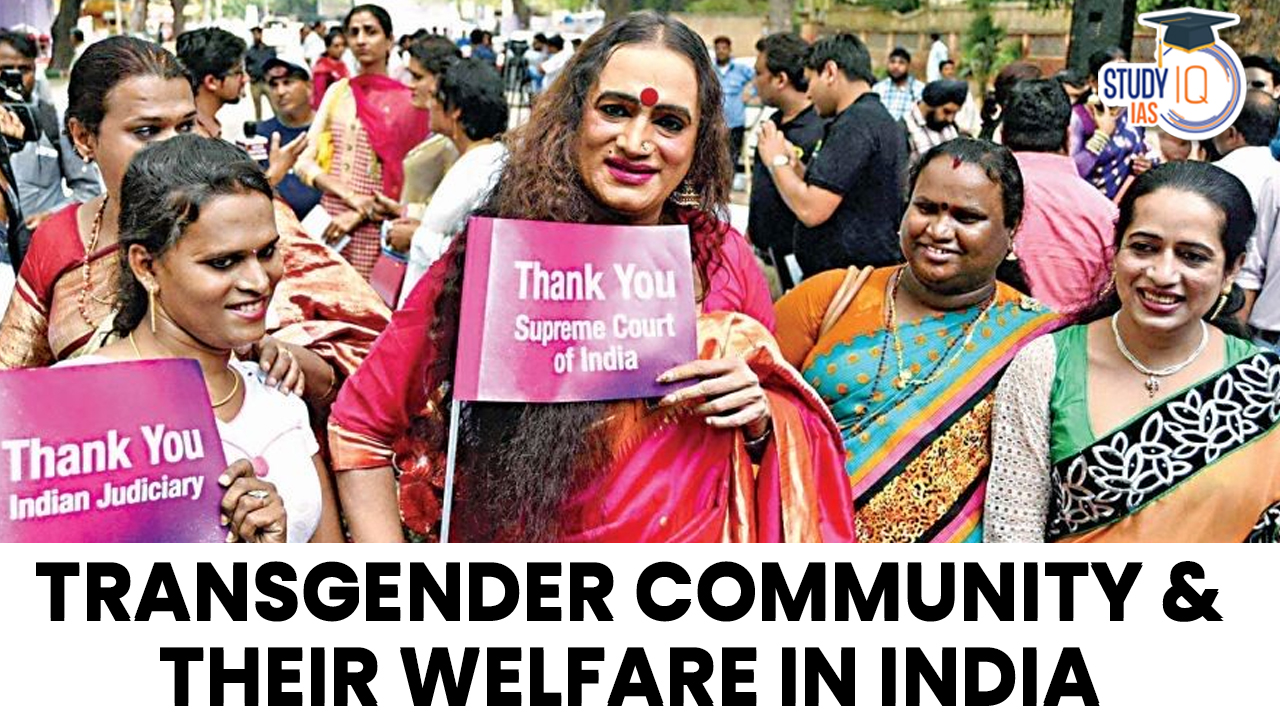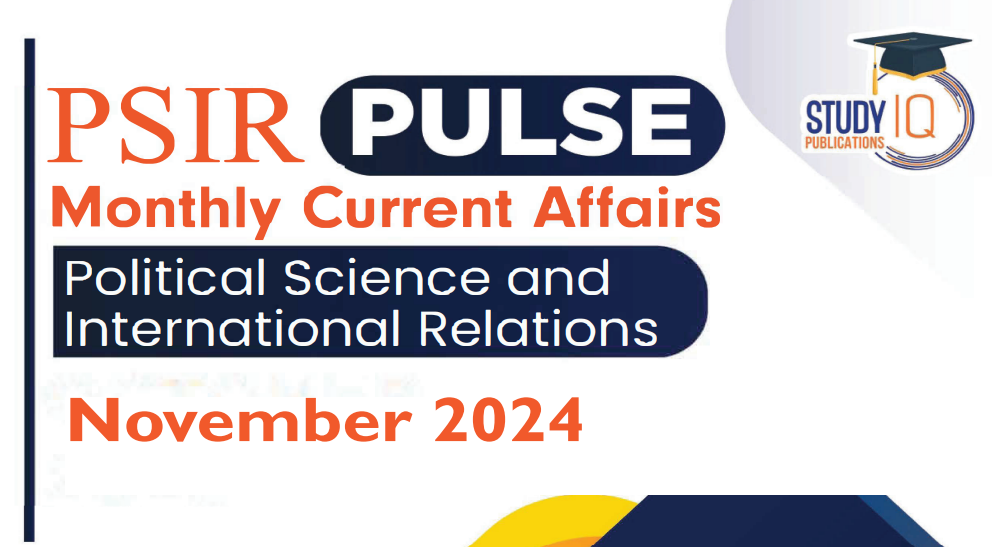Table of Contents
Context: The National Human Rights Commission (NHRC) issued an advisory to the Centre, States and UTs to ensure the welfare of transgender persons.
Key Highlights of the NHRC’s Advisory
- Discrimination Concerns: The NHRC notes that despite legal reforms, transgender individuals in India still face discrimination, which leads to disparities in employment opportunities, limited access to healthcare, and exclusion from social circles.
- Welfare Measures: The advisory suggested several welfare measures which include providing separate toilets, offering free sex reassignment surgery, safeguarding pension rights, and ensuring inheritance rights for transgender individuals.
- Family Pension: The advisory suggests that a single transchild of a deceased government employee or pensioner should be treated as an unmarried daughter for the purpose of family pension and other benefits.
- Inheritance Rights: Transgender persons should be allowed to inherit ancestral agricultural land, according to the advisory.
- Identity Card: The NHRC recommends providing a multi-purpose identity card to transgender individuals. This card can help them access government schemes and other benefits more easily.
- Insurance Acceptance: Insurance companies are advised to consider and accept the Transgender Certificate issued by the appropriate authority for document verification purposes.
- Timely Release of Funds: The NHRC urged the government to ensure the timely release of allocated funds for the Garima Greh shelter scheme.
- Implementation and Reporting: The NHRC has asked the stakeholders to implement its recommendations effectively and submit “action-taken” reports within two months.
About Transgenders
- According to the World Health Organization, Transgender is an umbrella term for people whose gender identity and expression does not conform to the norms and expectations traditionally associated with the sex assigned to them at birth.
- They are referred to as transsexuals if they desire medical assistance in order to make the transition from one biological sex to another.
- As per the Census of India 2011, the total population of Transgenders in India is 4.9lakh
- The highest proportion of the trans-gender population, about 28%, has been identified in Uttar Pradesh followed by Andhra Pradesh, Maharashtra, Bihar, Madhya Pradesh and West Bengal.
- In India, there are a wide range of transgender related identities which includes the Hijras, Aravanis, Kothis, Jogtas/ Jogappas, Shiv Sakthis.
Challenges Faced by the Transgender Community
- Discrimination: They experience discrimination at work, in educational institutions, and in their own homes, which negatively impact their well-being.
- Social Stigma: Transgender individuals often face social stigma and exclusion, making it difficult for them to adopt children, inherit property, or access basic rights and services. They may be marginalized and forced into menial jobs or pushed into sex work as a result of limited opportunities.
- Unemployment: Due to the associated societal stigma, the community has few employment options and experiences severe discrimination at work.
- Lack of public amenities: They have trouble accessing public restrooms and other public areas. In hospitals, schools, and prisons, they frequently encounter issues.
- Gender-based violence: Transgenders are often subjected to sexual abuse, rape and exploitation.
- Healthcare Disparities: Transgender people often encounter challenges in accessing adequate healthcare services that are sensitive to their specific needs.
- Lack of Representation: They are often underrepresented in media, politics and governance and are not included in mainstream society. This can make it difficult for them to have their voices heard and for their needs to be addressed.
Transgender rights in India
- Third Gender: The Supreme Court in 2014 officially declared ‘transgender’ as the ‘third gender’ in India via the landmark judgment NALSA V. Union of India & Ors (2014).
- The court held that all transgender persons are entitled to fundamental rights under Article 14 (Equality), Article 15 (Non-Discrimination), Article 16 (Equal Opportunity in Public Employment), Article 19(1)(a) (Right to Free Speech) and Article 21 (Right to Life) of the Indian Constitution.
- In 2020, the parliament legally recognized ‘transgender’ as an official gender in India.
- Liberty to Choose Sexual or Gender Identity: In the case of G. Nagalakshmi v. Director General of Police (2014), the Madras High Court observed that in the absence of any special law, any person has the liberty to choose their sexual or gender identity and upheld the petitioner’s right to choose their own gender.
- Right to Privacy: In Puttuswamy v. Union of India (2017), the Supreme Court noted the constitutional right to privacy inherent in the right to life, equality and fundamental freedoms. This includes the right to have intimate relations of one’s choice and the right to sexual orientation and gender identity.
- Decriminalisation of Section 377 of IPC: In Navtej Singh Johar v. the Union of India (2018), the Supreme Court (SC) decriminalised homosexuality by striking off parts of Section 377 of the Indian Penal Code (IPC) which were held violative of Fundamental Rights of LGBTQ Community.
Transgender Persons (Protection of Rights) Act, 2019
The Act aims to end discrimination against transgender persons in accessing education, employment and healthcare. Key Provisions of the Act Include:
- Definition of a transgender person: It defines a transgender person as one whose gender does not match the gender assigned at birth.
- It includes trans-men and trans-women, persons with intersex variations, gender-queers, and persons with socio-cultural identities, such as kinnar and hijra.
- Intersex variations are defined to mean a person who at birth shows variation in his or her primary sexual characteristics, external genitalia, chromosomes, or hormones from the normative standard of male or female body.
- Prohibition against discrimination: The Act prohibits the discrimination against a transgender person, including denial of service or unfair treatment in relation to: (i) education; (ii) employment; (iii) healthcare; (iv) access to, or enjoyment of goods, facilities, opportunities available to the public; (v) right to movement; (vi) right to reside, rent, or otherwise occupy property; (vii) opportunity to hold public or private office; and (viii) access to a government or private establishment in whose care or custody a transgender person is.
- Right of residence: Every transgender person shall have a right to reside and be included in his household.
- If the immediate family is unable to care for the transgender person, the person may be placed in a rehabilitation centre, on the orders of a competent court.
- Employment: No government or private entity can discriminate against a transgender person in employment matters, including recruitment, and promotion.
- Every establishment is required to designate a person to be a complaint officer to deal with complaints in relation to the Act.
- Education: Educational institutions funded or recognised by the relevant government shall provide inclusive education, sports and recreational facilities for transgender persons, without discrimination.
- Health care: The government must take steps to provide health facilities to transgender persons including separate HIV surveillance centres, and sex reassignment surgeries.
- The government shall review medical curriculum to address health issues of transgender persons, and provide comprehensive medical insurance schemes for them.
- Certificate of identity for a transgender person: A transgender person may make an application to the District Magistrate for a certificate of identity, indicating the gender as ‘transgender’.
- Offences and penalties: The Act recognize the following offences against transgender persons: (i) forced or bonded labour (excluding compulsory government service for public purposes), (ii) denial of use of public places, (iii) removal from household, and village, (iv) physical, sexual, verbal, emotional or economic abuse. Penalties for these offences vary between six months and two years, and a fine.
- National Council for Transgender persons (NCT): The Council will advise the central government as well as monitor the impact of policies, legislation and projects with respect to transgender persons. It will also redress the grievances of transgender persons.
- The NCT will consist of:
- Union Minister for Social Justice (Chairperson);
- Minister of State for Social Justice (Vice- Chairperson);
- Secretary of the Ministry of Social Justice;
- one representative from ministries including Health, Home Affairs, and Human Resources Development.
- Other members include representatives of the NITI Aayog, and the National Human Rights Commission.
- State governments will also be represented.
- The Council will also consist of five members from the transgender community and five experts from non-governmental organisations.
- The NCT will consist of:
Initiatives for Transgender Community in India
- SMILE (Support for Marginalized Individuals for Livelihood and Enterprise): This scheme has been launched by the Ministry of Social Justice and Empowerment. Key features include:
- Counseling, basic documentation, education, skill development, financial assistance to transgender students.
- Composite medical health and setting up of Garima Grehs in each state for providing shelter facility for abandoned and orphaned transgender persons.
- Transgender protection cells in India for providing quick redressal of offences & crimes against transgender persons.
- National Education Policy 2020: NEP 2020 identifies transgender children as Socio-Economically Disadvantaged Groups and provides for equitable quality education for all such students.
- A ‘Gender-Inclusion Fund’ will be constituted under the new policy to build the nation’s capacity to provide equitable quality education for all girls as well as transgender students.
- PM-DAKSH: The Ministry of Social Justice and Empowerment is imparting skill development training to the Transgender beneficiaries of the SMILE Scheme through PM-DAKSH.
State laws to protect the transgender population:
- Odisha – ‘Sweekruti’: To secure the rights of transgender persons and ensure equitable justice. Skill up-gradation, legal aid, health care provision.
- Kerala: Transgender policy in 2015, Schools, Justice board for welfare of transgenders, Fully Transgender run metro station, G-Taxis: entirely owned and run by transgenders, free sex-reassignment surgeries.
- Tamil Nadu: Transgender welfare policy, free surgeries, the first state to form a Transgender board with members from the community.
- Chandigarh: Transgender board comprising members from all departments viz., police, health, social welfare, education and the law department.
Way Forward
- Acceptance: The social stigma attached to the transgender community needs to be eliminated through a multifaceted strategy with a focus on public awareness initiatives.
- To recognize the transgender community as an essential part of societal life, there needs to be widespread sensitization, beginning at the school level.
- Education: It’s crucial to develop an efficient system for educating students at colleges and universities on the needs and makeup of the transgender community.
- Financial Security: To begin their career as an entrepreneur or businessman, it is important to guarantee liberal credit facilities and financial help.
- Employment: Plans and initiatives should focus on enhancing the skills of transgender communities. The hiring, retention, and promotion processes must successfully abide by anti-discrimination policies.
- Transgender-Inclusive Policies: Legal and the law enforcement systems need to be empowered and sensitized on the issues of Transgender community.


 Crime Against Humanity (CAH Treaty)
Crime Against Humanity (CAH Treaty)
 Languages of the World List, Most Spoken...
Languages of the World List, Most Spoken...
 Hindu Marriage Act 1955, Salient Feature...
Hindu Marriage Act 1955, Salient Feature...




















